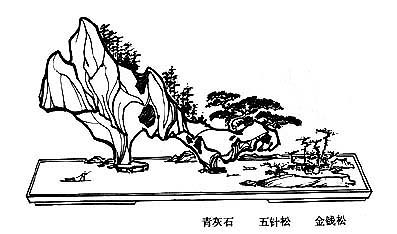三
十
六
計
36 Ji 
 – Les 36 stratagèmes
– Les 36 stratagèmes
Répertoire de proverbes tactiques liés au Yi Jing et aide-mémoire pour se tirer de situations conflictuelles. Trad. Doc Mac Jr (fr) et Vestappen (en)
25. 偷
樑
換
柱
« Voler les poutres, échanger les piliers »
26. 指
桑
罵
槐
« Injurier l'acacia en désignant le mûrier »
27. 假
癡
不
癲
« Jouer l'idiot sans être fou »
28. 上
屋
抽
梯
« Monter sur le toit et retirer l'échelle »
29. 樹
上
開
花
« Sur l'arbre les fleurs s'épanouissent »
30. 反
客
為
主
« Changer la position de l'invité et de l'hôte »
36ji V. 29.
« Sur l'arbre les fleurs s'épanouissent »
Exagère afin de tromper ton adversaire,
laisse le croire que tu es puissant.
Exploiter les forces externes (alliés) pour créer une situation favorable, ainsi une petite armée acquerra une grande force.
L'oie sauvage s'approche graduellement du chemin des nuages. Ses plumes peuvent être utilisées pour les rites.*
Attachez de très réalistes fleurs de soie à un arbre qui ne fleurit plus, et même les plus suspicieux le croiront capable de fleurir. En temps de guerre, si vous manquez de puissance, vous pouvez avoir recours à des forces externes (conditions naturelles, alliés, ou même un ennemi particulièrement stupide) pour mener à bien cette stratégie. Au minimum, vous serez capable d'intimider ou de distraire l'adversaire et de retarder sur votre point faible. Et au mieux, vous pourrez transformer vos forces externes en de puissantes armes pour détruire l'ennemi.
* Texte de l'hexagramme n°53 du Yi Jing : Jian (progresser)... Ainsi de même que les plumes des oies sauvages peuvent être utilisées pour les parures de cérémonie, un ermite qui vit à l'écart de la société exerce malgré tout une influence favorable sur le peuple par sa haute moralité. Dans un contexte militaire, même les apparences extérieures peuvent produire des effets concrets.
Doc Mac Jr
Tie Silk Blossoms to the Dead Tree
Tying silk blossoms on a dead tree gives the illusion that the tree is healthy. Through the use of artifice and disguise make something of no value appear valuable; of no threat appear dangerous; of no use, useful.
Three Kingdoms Period China
During the final years of the Three Kingdoms, Suma Yan usurped the throne of Wei, made himself king, and changed the name of the kingdom from Wei to Jin. News of this reached the neighboring king of Wu who knew that his kingdom would be the next likely target of the ambitious Suma. He worried so much that he died several days later. Sun Hao then inherited the throne of Wu and immediately took to pleasure and vice neglecting state affairs. Over the next few years the new king of Wu grew increasingly paranoid and had dozens of his advisors and commanders and their entire families executed on the slightest suspicion and as a result he was widely reviled. Hearing that the people of Wu despised their king, Suma ordered a naval attack led by commander Wang Chun. The king of Wu had no idea of what to do against the impending naval attack. He convened what remained of his council and one advisor recommended stringing a bamboo barrier across the river to prevent the fleet from reaching the Wu capital of Jian Yeh. The king agreed and heavy bamboo cords were made and strung just below the surface. When Commander Wang heard about the barrier he laughed. He ordered his men to build huge rafts from timbers on which were erected straw dummies dressed in armor and holding weapons. The dummies were soaked in oil and a trip mechanism was attached that would ignite the dummies when the rafts struck the barrier. The rafts burned through the bamboo and continued on down stream to the Wu capital. The spectacle of a fleet of rafts full of burning men so frightened the Wu troops that they fled in terror. Suma captured Wu and went on to found the short-lived Jin dynasty.
Verstappen

Les 36 stratagèmes – 36 Ji V. 29. – Chinois on/off – Français/English
AliasThirty-Six Strategies, Thirty-Six Stratagems, Secret Art of War, Les 36 stratagèmes, Les Trente-six stratégies
Le Canon des Poèmes, Les Entretiens, La Grande Étude, Le Juste Milieu, Les Trois Caractères, Le Livre des Mutations, De la Voie et la Vertu, 300 poèmes Tang, L'Art de la guerre, Trente-six stratagèmes
Bienvenue, aide, notes, introduction, table.
Index – Contact – Haut de page
